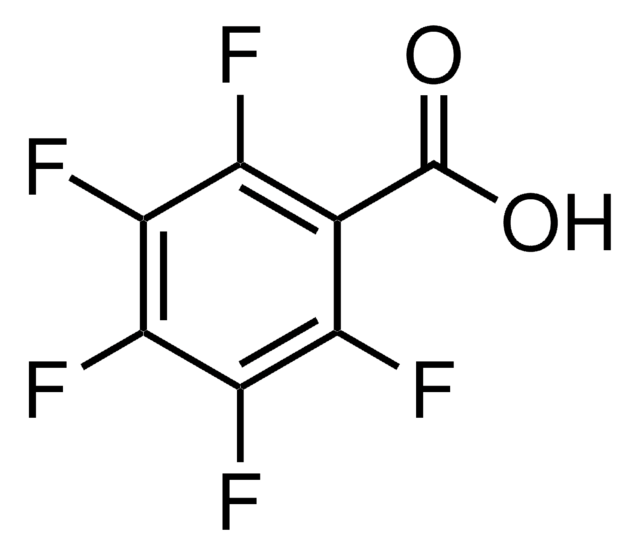38419
α-Cyano-2,3,4,5,6-pentafluorocinnamic acid
matrix substance for MALDI-MS, ≥95.0% (HPLC)
Synonyme(s) :
2-Cyano-3-(2,3,4,5,6-pentafluorophenyl)-2-propenoic acid, PentaFCCA
About This Item
Produits recommandés
Qualité
matrix substance for MALDI-MS
Niveau de qualité
Pureté
≥95.0% (HPLC)
Classe(s) fonctionnelle(s) de l'analyte
drugs of abuse, ionic liquids (quantification)
Classe(s) chimique(s) de l'analyte
chlorinated lipids, lipids, peptides, phospholipids, phosphopeptides
Technique(s)
collision-induced dissociation MS/MS (CID-MS/MS): suitable
matrix-enhanced secondary ion MS (ME-SIMS): suitable
Solubilité
methanol: 100 mg/10 mL, clear, colorless to light yellow
Chaîne SMILES
OC(/C(C#N)=C/C1=C(F)C(F)=C(F)C(F)=C1F)=O
InChI
1S/C10H2F5NO2/c11-5-4(1-3(2-16)10(17)18)6(12)8(14)9(15)7(5)13/h1H,(H,17,18)/b3-1+
Clé InChI
LYNQRDIQUFMLTI-HNQUOIGGSA-N
Vous recherchez des produits similaires ? Visite Guide de comparaison des produits
Produit(s) apparenté(s)
Mention d'avertissement
Warning
Mentions de danger
Classification des risques
Acute Tox. 4 Dermal - Acute Tox. 4 Inhalation - Acute Tox. 4 Oral - Eye Irrit. 2 - Skin Irrit. 2 - STOT SE 3
Organes cibles
Respiratory system
Code de la classe de stockage
11 - Combustible Solids
Classe de danger pour l'eau (WGK)
WGK 3
Point d'éclair (°F)
Not applicable
Point d'éclair (°C)
Not applicable
Faites votre choix parmi les versions les plus récentes :
Certificats d'analyse (COA)
Vous ne trouvez pas la bonne version ?
Si vous avez besoin d'une version particulière, vous pouvez rechercher un certificat spécifique par le numéro de lot.
Déjà en possession de ce produit ?
Retrouvez la documentation relative aux produits que vous avez récemment achetés dans la Bibliothèque de documents.
Notre équipe de scientifiques dispose d'une expérience dans tous les secteurs de la recherche, notamment en sciences de la vie, science des matériaux, synthèse chimique, chromatographie, analyse et dans de nombreux autres domaines..
Contacter notre Service technique




![trans-2-[3-(4-tert-Butylphenyl)-2-methyl-2-propenylidene]malononitrile matrix substance for MALDI-MS, ≥99.0% (HPLC)](/deepweb/assets/sigmaaldrich/product/structures/249/587/f8021369-f65a-413d-887d-3c8a4d2a248f/640/f8021369-f65a-413d-887d-3c8a4d2a248f.png)



